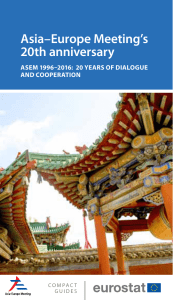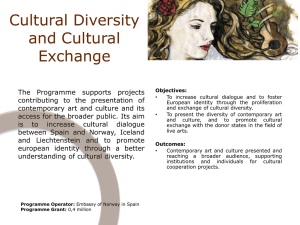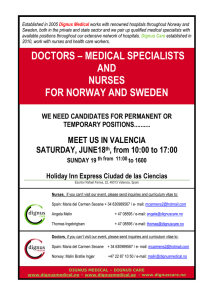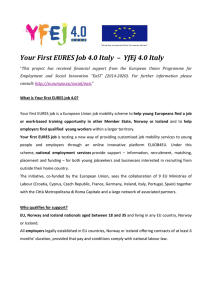Asia-Europe Meeting (ASEM)
Anuncio
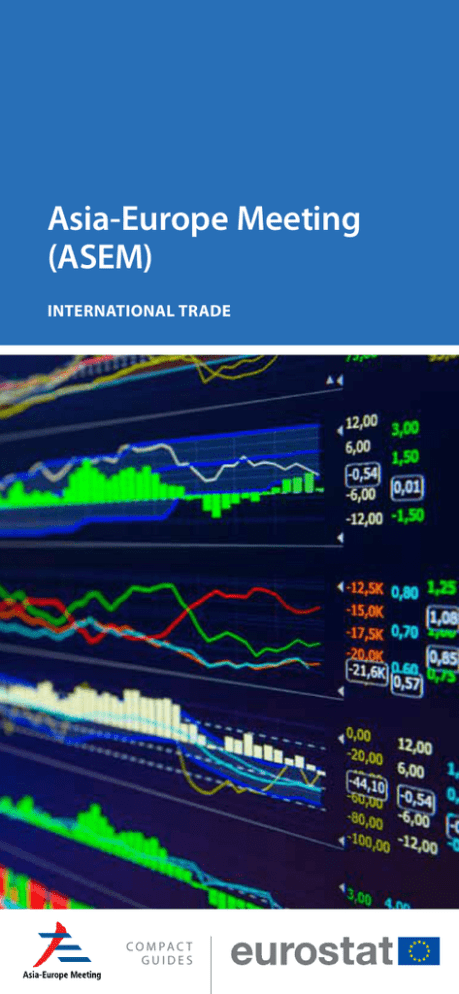
Asia-Europe Meeting (ASEM) International trade co m pac t g u i d es Strengthened trade balance across ASEM In 2014, all the major regions participating in the Asia-Europe Meeting (ASEM) recorded a trade surplus. In absolute terms, the trade surplus was highest for the European Union (EU-28), reaching 308 billion EUR. Since the foundation of ASEM in 1996, the trade balance has improved considerably for all groups of ASEM partners. For ASEM as a whole, the trade surplus rose from 80 billion in 1996 to 519 billion EUR in 2014. A part of this rise has been caused by further partners joining into the ASEM process since its inception. However, the largest part of the increase reflects the improved trade balance and indeed increased trade of all ASEM regions. Behind these improved trade balances lies an increase in exports relative to imports over this period. Whereas the exports of the ASEM partners were 2% higher than their imports in 1996, this difference had reached 9% in 2014. Most notable is the increase for the ASEAN countries, where exports were 8% lower than imports in 1996, but 6% higher in 2014. ASEM partners have an important contribution to worldwide exports Over the period 1996 - 2014, the share of the ASEM partners in the total exports of the world rose from 59% in 1996 to 71% in 2014. This increase was significant between 2012 and 2014. Within ASEM, the EU-28 partners accounted for around half of the ASEM exports in 2014, followed by the ‘NESA countries’ (including amongst others China, India and Australia) which accounted for one third. Amongst the individual ASEM partners, China led with 21% of the ASEM exports in 2014, followed by Germany with 13% and Japan with 6%. Regarding the different products exported from the European ASEM partners to the Asian ASEM partners, machinery and vehicles is by far the dominating product group. In 2014, these products made up 46% of the exports from the European to the Asian ASEM partners. In comparison, the second most important product group was chemicals, which accounted for 15% of the total. China and Germany the largest importers within ASEM The ASEM partners are also some of the largest importers in the world. In 2014, the ASEM partners accounted for 67% of all imports in the world. As for exports, the EU accounted for over half of the ASEM imports and the NESA countries for one third. China was the largest importer amongst the ASEM partners, with 18% of the total imports to ASEM, followed by Germany (11%), Japan (8%), the United Kingdom and France (both 6%). With 34% of the total, machinery and vehicles was the largest product group imported by the European ASEM partners from the Asian ASEM partners in 2014. Also energy products (petroleum products) (21%) and miscellaneous manufactured products (20%) were important for this trade within the ASEM partnership. Positive current account balance for all main groups of ASEM partners In addition to the trade balance on goods and services, the current account also includes income from investments abroad minus payments to foreign investors and net cash transfers. In 2014, the current account balance was positive for ASEM as a whole and for all of the main groups of ASEM partners. For ASEM as a whole, the current accounts balance corresponded to 1.8% of its GDP. The highest share of the current account balance in the GDP was noted for Norway and Switzerland (8.2%). The current account balance as share of GDP was also noticeable for ASEAN (3.1%). However, whereas the current account balance fell over the last two years for Norway and Switzerland, it picked up again from 2013 to 2014 for ASEAN. Trade openness is increasing Compared to the founding year of ASEM, 1996, the importance of trade had increased substantially by 2014 for most groups of ASEM partners. The trade openness, in terms of total trade (exports plus imports) relative to GDP, reached 50% in 2014. This was up 15 percentage points from the 35% recorded in 1996. Although ASEAN was the only group of ASEM partners where this ratio fell over the period, from 96% in 1996 to 86% in 2014, it was still the ASEM region with the highest ratio. Singapore stood out amongst the individual ASEM partners, with total trade corresponding to 252% of GDP in 2014. Shares of the Top 5 countries in total ASEM imports of goods, 2014 (1) China 18% Germany 11% Other ASEM partners 51% Japan 8% United Kingdom 6% France 6% (1) Bangladesh, Cambodia, Lao PDR, Myanmar, Korea and Russia not available Source: World Bank Imports of goods to European ASEM partners from Asian ASEM partners, by SITC section, 2014 (billion EUR) 20 Food and live animals 2 Beverages and tobacco 14 Crude materials, except fuels 169 Energy products 6 Oils, fats and waxes 49 Chemicals 87 Manuf'd goods classified by material 274 Machinery and vehicles 161 Miscellaneous manuf'd articles 28 Products not clasified elsewhere 0 50 100 150 200 (1) Bangladesh, Cambodia, Lao PDR, Myanmar, Korea and Russia not available Source: World Bank 250 300 Total trade in goods relative to GDP (trade openness) by ASEM regions, 1996 and 2014 (% of GDP) 50 65 2014 (1) 68 86 33 35 40 1996 (2) 96 22 0 10 20 30 40 50 60 70 ASEM EU-28 Norway and Switzerland (3) ASEAN (1) Bangladesh, Cambodia, Lao PDR, Myanmar, Korea and Russia not available; 2 ( ) Belgium, Luxembourg; Brunei Darussalam and Vietnam not available; (3) Norway and Switzerland are ASEM partners since 2012 Source: World Bank 80 90 100 NESA Total trade in goods relative to GDP (trade openness), Top 10 countries, 2014 (1) (% of GDP) Singapore 252 Belgium 174 Slovakia 163 Vietnam 160 Czech Republic 159 Hungary 156 Estonia 142 Lithuania 140 Malaysia 131 Netherlands 123 0 50 100 150 200 250 300 (1) Korea, Lao PDR, Bangladesh, Russia, Cambodia and Myanmar not available Source: World Bank Source: World Bank Foreign direct investment in ASEM: net inflows, by main country groups, 2010-2014 (current EUR per capita) 2010 2011 2012 2013 2014 208 194 150 ASEM 188 240 EU-28 850 1,232 960 850 464 - - 3,197 -1,244 1,875 136 119 147 162 154 91 104 93 106 95 Norway and Switzerland (1) ASEAN NESA ( ) Norway and Switzerland are ASEM partners since 2012 1 Source: World Bank World Development indicators Balance of payments in ASEM: current account balance, by main country groups, 2014 (¹) (% of GDP) ASEM 1.8 EU-28 1.8 Norway and Switzerland (2) 8.2 ASEAN 3.1 1.2 NESA 0 1 2 3 4 5 6 7 8 ( ) Ireland, Croatia, Malta, Poland, Finland, Norway, Cambodia, Lao PDR, Malaysia, Myanmar, Vietnam, China and Mongolia: 2013 data; Brunei Darussalam not available Source: World Bank World Development indicators 1 9 Balance of payments in ASEM: current account balance, by main country groups, 2010–2014 (1) (% of GDP) 12 10 8 6 4 2 0 2010 ASEM 2011 EU-28 2012 Norway and Switzerland (2) 2013 2014 ASEAN NESA (1) Missing data: 2010 and 2011: Brunei Darussalam and Myanmar. 2013: Brunei Darussalam. 2014: Ireland, Croatia, Malta, Poland, Finland, Norway, Brunei Darussalam, Cambodia, Lao PDR, Malaysia, Myanmar, Vietnam, China and Mongolia; (2) Norway and Switzerland are ASEM partners since 2012 Source: World Bank World Development indicators Asia-Europe Meeting partners: European Union Member States: Belgium, Bulgaria, Czech Republic, Denmark, Germany, Estonia, Ireland, Greece, Spain, France, Croatia, Italy, Cyprus, Latvia, Lithuania, Luxembourg, Hungary, Malta, Netherlands, Austria, Poland, Portugal, Romania, Slovenia, Slovakia, Finland, Sweden and United Kingdom Other European partners: Norway and Switzerland ASEAN member states: Brunei Darussalam, Cambodia, Indonesia, Lao PDR, Malaysia, Myanmar, Philippines, Singapore, Thailand and Viet Nam Northeast and South Asia (NESA) partners: Australia, Bangladesh, China, India, Japan, Kazakhstan, Republic of Korea, Mongolia, New Zealand, Pakistan and Russian Federation International institutions: European Union and ASEAN Secretariat International trade balance in goods of the ASEM regions, 1996 and 2014 (billion EUR) 519 308 2014 (1) 92 67 50 80 90 1996 (2) 13 -23 -100 0 ASEM 100 EU-28 200 300 400 Norway and Switzerland (3) 500 ASEAN 600 NESA (1) Bangladesh, Cambodia, Lao PDR, Myanmar, Korea and Russia not available; (2) Belgium, Luxembourg, Brunei Darussalam and Vietnam not available; (3) Norway and Switzerland are ASEM partners since 2012 Source: World Bank Ratio of exports of goods relative to imports of goods of the ASEM regions, 1996 and 2014 (%) 109 102 125 2014 (1) 106 104 102 105 1996 (2) 92 108 0 20 ASEM 40 EU-28 60 80 Norway and Switzerland (3) 100 ASEAN (1) Bangladesh, Cambodia, Lao PDR, Myanmar, Korea and Russia not available; (2) Belgium, Luxembourg; Brunei Darussalam and Vietnam not available; (3) Norway and Switzerland are ASEM partners since 2012 Source: World Bank 120 NESA 140 Shares of the ASEM regions in total world exports of goods, by enlargement round (1) (%) 80% 70% 60% 50% 40% 30% 20% 10% 0% 1996 2004 EU-28 2008 2010 Norway and Switzerland (2) 2012 ASEAN 2014 NESA (1) 1996: Belgium, Luxembourg, Brunei Darussalam and Vietnam not available; 2004: Lao PDR and Myanmar not available; 2008: Brunei Darussalam, Lao PDR, Mongolia and Myanmar not available; 2010: Brunei Darussalam, Lao PDR and Mongolia not available; 2012: Lao PDR, Mongolia, Myanmar and Bangladesh not available; 2014: Bangladesh, Cambodia, Lao PDR, Myanmar, Korea and Russia not available; 2 ( ) Norway and Switzerland are ASEM partners since 2012. Source: World Bank Share of each ASEM region in total ASEM exports of goods, 2014 (1) (%) Norway and Switzerland 4% ASEAN 10% NESA 33% (¹) Bangladesh, Cambodia, Lao PDR, Myanmar, Korea and Russia not available Source: World Bank EU-28 53% Shares of the Top 5 countries in total ASEM exports of goods, 2014 (1) (%) China 21% Other ASEM partners 50% Germany 13% Japan 6% France 5% Netherlands 5% (1) Bangladesh, Cambodia, Lao PDR, Myanmar, Korea and Russia not available Source: World Bank Exports of goods from European ASEM partners to Asian ASEM partners, by SITC section, 2014 (billion EUR) 25 Food and live animals 8 Beverages and tobacco 17 Crude materials, except fuels 11 Energy products (1) Oils, fats and waxes 1 91 Chemicals 60 Manuf'd goods classified by material 269 Machinery and vehicles Miscellaneous manuf'd articles 64 Products not clasified elsewhere 43 0 50 100 (1) Energy data for Lao PDR not available Source: Eurostat (online data codes: DS-018995 and DS-043227) 150 200 250 300 Shares of the ASEM regions in total world imports of goods, by enlargement rounds (1) (%) 80% 70% 60% 50% 40% 30% 20% 10% 0% 1996 2004 EU-28 2008 2010 Norway and Switzerland (2) 2012 ASEAN 2014 NESA (1) 1996: Belgium, Luxembourg, Brunei Darussalam and Vietnam not available; 2004: Lao PDR and Myanmar not available; 2008: Brunei Darussalam, Lao PDR, Mongolia and Myanmar not available; 2010: Brunei Darussalam, Lao PDR and Mongolia not available; 2012: Lao PDR, Mongolia, Myanmar and Bangladesh not available; 2014: Bangladesh, Cambodia, Lao PDR, Myanmar, Korea and Russia not available; 2 ( ) Norway and Switzerland are ASEM partners since 2012. Source: World Bank Share of each ASEM region in total ASEM imports of goods, 2014 (1) Norway and Switzerland 3% ASEAN 10% NESA 33% (1) Bangladesh, Cambodia, Lao PDR, Myanmar, Korea and Russia not available Source: World Bank EU-28 54% For information on the Asia-Europe Meeting: ASEM Infoboard: http://www.aseminfoboard.org The future of the Asia-Europe Meeting (ASEM) Looking ahead into ASEM’s third decade The future of the Asia-Europe Meeting (ASEM): Looking ahead into ASEM’s third decade KS-01-16-542-EN-N Asia-Europe Meeting (ASEM) This project is funded by the European Union ASEM At 20 the challenge of connectivity ASEM at 20: The challenge of connectivity Autumn 2015 Media partner With the support of Eurostat cooperation resources For information on Eurostat’s statistical cooperation activities: http://ec.europa. eu/eurostat/web/international-statistical-cooperation/overview E-mail: [email protected] Asia-Europe meeting (ASEM) A stAtisticAl portrAit 2016 edition Asia-Europe Meeting A statistical portrait 2016 edition s tat i s t i c a l books Guide to statistics in European Commission development cooperation 2013 edition ISSN 2315-0815 Essential SNA: Building the basics Essential SNA: Building the basics 2014 edition 2014 edition Compact guides Snapshot A user-friendly tool to assess the strengths and weaknesses of National Statistical Systems Snapshot A user-friendly tool to assess National Statistical Systems See ‘Statistics explained’ for further insight into Eurostat’s international cooperation activities: http://ec.europa.eu/eurostat/statistics-explained/index.php/NonEU_countries See in particular the article ‘Asia-Europe Meeting (ASEM) - a statistical portrait - key facts’ http://ec.europa.eu/eurostat/statistics-explained/index.php/AsiaEurope_Meeting_%28ASEM%29_-_a_statistical_portrait_-_key_facts See also European External Action Service (EEAS): http://eeas.europa.eu ISBN 978-92-79-58768-9 doi:10.2785/654937 © European Union, 2016 Cover: © shutterstock.com
